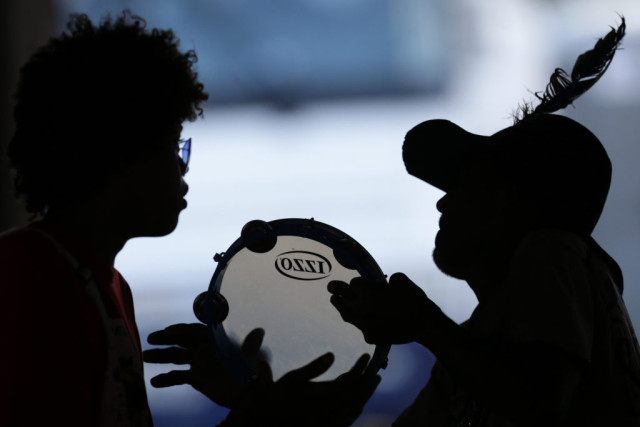BRASILIA, Brazil (AP) — Separated by only a boulevard, two rival camps of demonstrators in Brazil’s capital underscore the sharp ideological divide that is playing out in Congress as lawmakers debate whether to oust the president.
On one side of Brasilia’s showcase Eixo Monumental, which cuts through the center of city and dead ends at Congress, several thousand supporters of embattled President Dilma Rousseff have pitched a tent city, sleeping in hammocks and eating rice and beans served by volunteers at communal kitchens.
Largely union members and land reform activists, and overwhelmingly poor, they have come by bus from across this continent-sized country to defend Rousseff and her left-leaning Workers’ Party, which they credit for unprecedented improvements in their lives. They call the impeachment debate in the nearby lower house of Congress that started Friday and is expected to go all weekend an attempt by Brazil’s elite to take back power after 13 years of Workers’ Party rule.
“They’re trying to knock down what the Workers’ Party conquered, what we conquered,” said Francisco das Chagas, a 47-year-old mechanic who came from his home state of Alagoas, in the impoverished northeastern region that’s Rousseff’s stronghold. “It’s classist.”
On the other side of the boulevard, several hundred better-heeled protesters are demanding Rousseff’s impeachment, blaming her for the tanking economy and the plague of corruption, which are reflected in the country’s sky-high taxes and dismal public hospitals, schools and other basic services. They say a fresh start with a new president is the only hope for breathing life into an economy that’s expected to contract around 4 percent this year.
Pro-impeachment protester Joao Pedro Netto says that while the Workers’ Party was born out of a desire to help the poor, it is now as corrupt as any other of Brazil’s more than 30 political parties. The 30-year-old small business owner said improving the country’s woeful public school system for his two small children is his top priority and for this to happen Rousseff’s party must go.
Both sides have pledged to flood the city with supporters ahead of a crucial vote Sunday in the Chamber of Deputies, which will determine whether the impeachment proceeds to the Senate. Proponents of impeachment need 342 of 513 votes, and tallies in the main Brazilian news outlets show them hovering near that number.
The proceedings stem from alleged violations of Brazil’s fiscal laws committed by Rousseff’s administration to shore up public support amid a flagging economy.
Rousseff says that such accounting was common practice, insisting that she committed no crime and denouncing the proceedings against her as a “coup.”
“Impeaching a president who has not committed a crime of responsibility is to rip the Brazilian constitution to shreds,” Rousseff said in a signed article published Saturday in the Folha de S. Paulo newspaper.
“To oppose and criticize my government is part of Democracy” she wrote. “But overthrowing a legitimately elected president who committed no crime is not part of Democracy. It is a coup.”
Her supporters in the tent city, which sprang up early this week as busloads of activists arrived from as far afield as the Amazonian state of Rondonia, say her government and that of her predecessor, Luiz Inacio Lula da Silva, served the interests of poor people like them.
Ze Silva, a 25-year-old schoolteacher from the agricultural heartland of Mato Grosso, warned that if Rousseff is pushed out “Brazil would return to its same old ways . and the masses would slide back into misery, like it used to be.”
However, the irony of the location of the pro-Rousseff camp wasn’t lost on their foes across the boulevard. The pro-government tents are pitched in the parking lot of Brasilia’s Mane Garrincha stadium, which underwent a $900 million facelift ahead of the 2014 World Cup, making it the world’s second most expensive stadium — despite the fact that Brazil’s capital does not have a top division soccer team to play in it.
This kind of wanton waste is just what has fueled anger against the government. The fight against corruption has been a rallying cry of the anti-Rousseff movement, fueling massive protests in recent months as an unfolding corruption probe centered around the state-run Petrobras oil company has exposed the extent of the rot.
While Netto and other pro-impeachment protesters want Rousseff out, they worry that the next batch of leaders would also be corrupt.
If the Chamber of Deputies votes Sunday to send the impeachment measure to the Senate and that body votes to open a trial against Rousseff, she would be suspended from office and Vice President Michel Temer would take over. Temer is implicated in the vast Petrobras corruption scheme. The next-in-line to take office after Temer is House Speaker Eduardo Cunha. He is also heavily implicated in the Petrobras scheme.
The political crisis has dragged on for months, hamstringing attempts to jumpstart the economy and battle an outbreak of the Zika virus. The country is also gearing up to host the Olympics.
“This issue has been an open wound for a long time,” said Leonardo Picciani, a congressman from Rio de Janeiro state who has gone against the pro-impeachment position of his party. “It must be closed on Sunday, whatever the result.”
The protesters, however, weren’t so sure.
Both side vowed to keep the encampments going until their side declares a definitive victory.
“If Brazil continues like this, it’s going to sink,” said Netto.

COMMENTS
Please let us know if you're having issues with commenting.